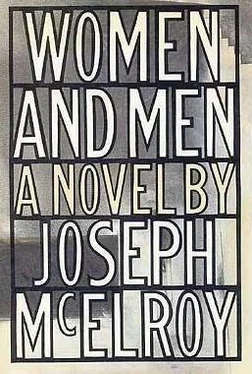Communicated, O.K., but how? In their few letters?
A letter might be instantly answered. Oh it would be.
Unless it was from her and he was away. Out of the country.
But after such an exchange, the chance of another on top of it would sometimes discover itself, and they would know at whatever degree of distance from one another that they were a little put off by this prospect.
Of incest? No, nor falsehood.
Repetition. With increments.
Graduated, he thought, graduated from First Marriage, a long enough one, graduated from an earlier hour of intimacy. His heart wanted to stop: for then, graduate angels, he heard her saying on the phone. And he exclaimed, You answered my thought! do you know that?
But then he couldn’t speak.
Go on, she said. He said, You answered my thought, the graduated part.
Oh, she said, with a bug in her voice, weren’t we always doing that? — or have we gotten better? I mean now that we aren’t together.
Just the opposite, it seemed to him.
His body got enormously heavy. Bone-tired. More slow than tired, promising to give up and let him go on ahead, hands heavy as they were said to be under hypnosis. He shouldn’t have let the marriage go, and yet then she was saying — she was crying a little, she rarely wept but when she did cry she’d been able to without missing a beat or breath of her conversation. Was it an act? What if it was, it was real (it occurred to him). Tricky? she once said, Why I owe it all to you — but now, you haven’t put on weight, have you? maybe I wouldn’t be so bone-tired, she said (so heavy, she thought), if we could just answer our thoughts and not have this phone that makes me think of you inside me — tongue, nose, big nose — inside me — she guffaws against his ear—"Ear!" — and has to cough through tears.
Go on, he says.
Ear bones, she coughs, every one, right down to the lobe, kid.
He felt so heavy the flesh was pulling away and he was with her, yet here.
Repetition, she said.
We’ll try it someday, he said, not knowing what it was that he had let go, a household, a hug, an inner kiss.
He knew she was thinking of his hand slipping down her ribs.
Sounds like some experiment, she said: that shouldn’t be repeated.
But the event, unforced, did just that. Repeated itself. They’d sense together an embarrassment. They’d know it as surely as they recalled her biting her lower lip when she was sure she had him and she couldn’t lose. Or him shutting his eyes when he couldn’t win. As surely as they recalled his call from Washington the first week of July one year when they were married to say he couldn’t join them in the country the next day because of the airlines strike and Joy saying with the slant in her voice down which they slipped like dual sinners, Take a train, Take a bus — when she knew that the strike was an assignment: yet one that someone else could have covered, she hardly knew the people he worked with but she knew that (and she knew a lot about his work and would talk about it). Yet the children — it was the children who were most disappointed that July day; and he knew this and the slant in her voice that was her irritation for not showing more disappointment herself — because she didn’t know how much there was —and she looked through the dry ovals of big leaves up against the window, rhododendron, and to the left the spruce trees, two of them — no, three for heaven’s sake — three, at three in the afternoon, and she looked beyond them into the leaves of the trees down by the pond and through these into the stippled pattern of glare off the pond — it was three-quarters of a mile across and it was called a pond — and she said into the phone, "It’s nice here." And she thought they ought to buy the place, thinking, It’s only the two miles from the village, which wasn’t what mattered — but then she heard the kids yelling, and Andy Injun flashed past the window and Flick came rushing by the house, and Flick stopped short, wondering among other things what she was doing playing with him, her long, fine hair combed out down to her bare ribs, hair across her cheek, and she looked into the window at her mother holding the phone receiver against her head and looked with a blankness Joy wanted her husband there to fill, blank like the children’s two curiosities sitting one winter morning so unfairly at the kitchen table with their father when she came in the front door with last night’s clothes on — so unfairly late when they should have been off to school — and in Washington (with voices behind him) he said to her in New Hampshire, "I can see Flick and Andy, I can see them, listen I see Flick through the window where you’re standing, hey for a second you weren’t mad."
"Oh get out, you only knew because I told you," she said.
"No you didn’t — you were telling me to take the train, and you were thinking of buying the place. You could run it as a non-profit home" — the words came out like that.
For your old age, she’d thought; but there in her ear — knowing she hadn’t said a thing about buying — she had felt him as if he were standing behind her, saying, as he now did say, "No for Christ’s sake excuse me, I only meant maybe I couldn’t get back if I didn’t go away. How’s that?"
"Lousy," she said.
"I need a haircut," he said, thinking of that Ray Spence, his hair as long as the Beatles’ then, and his speckled hand coaxing a goatee he had grown, looked right through Mayn when Mayn said a grim hello thinking of Spence’s hair, not his deals — sometimes she told him it was time—"I feel grubby, itchy," he said, and abruptly he was not so much in her ear as in front of her: not some male to be photographed for a frame on a wall enclosing a room — though she’d seen them do it both ways, woman in all her skirts seated, man above on two feet, but now he was seated in this photographerless pose into which she would put the two of them once every month or six weeks for many years in the city — hair the same matched with the same scissors, times collapsing into the same mindful hands playing above the same immemorial head in the city, and in the country in the summer, in New York, New Hampshire, come to think of it Brussels for a time that she had unilaterally terminated after the school in the person of a large-breasted teacher in a white blouse had repeatedly tried to make Flick right-handed — and in these poses Mayn was always in front of her, the wide head of coarse, grayish hair, a dish towel tucked into his neck, or an old sheet like in a regular man’s barbershop, for she’d taken her son Andrew to the barbershop on wide, prosperous Third Avenue that his friend went to, Andrew tight-roping the curb of the sidewalk, rising up on his sneakers as he did when he and his father and sister walked hand in hand through a slower-moving crowd from the subway to the Stadium, it was an exaggeration of the way everyone might walk in health and happiness.
In the barbershop Andrew wanted his mother to be not there yet not to leave.
It was like acquiring genuine qualifications under pretenses, and the next time, before his father took him to the park to play ball and then sit on a bench eating hot dogs and ice cream while his father recalled one of his own grandmother’s Indian stories about the giant Choorian bird that, like an intercontinental transoceanic steed, flew its mistress the Princess Nay of Manchoor to the land of the American Navajo and Pueblo but, in the absence of its accustomed food, ate the chief’s horses until at last he had to do something about it, Andrew was able first to take his father to the barbershop as if introducing him to a place where Andrew was known — knew the ropes, knew the drill — and so Andrew was glad to find his barber unoccupied and go directly to the chair where, standing, he could say that only he was having a haircut, not his father. (He said father.)
Читать дальше












